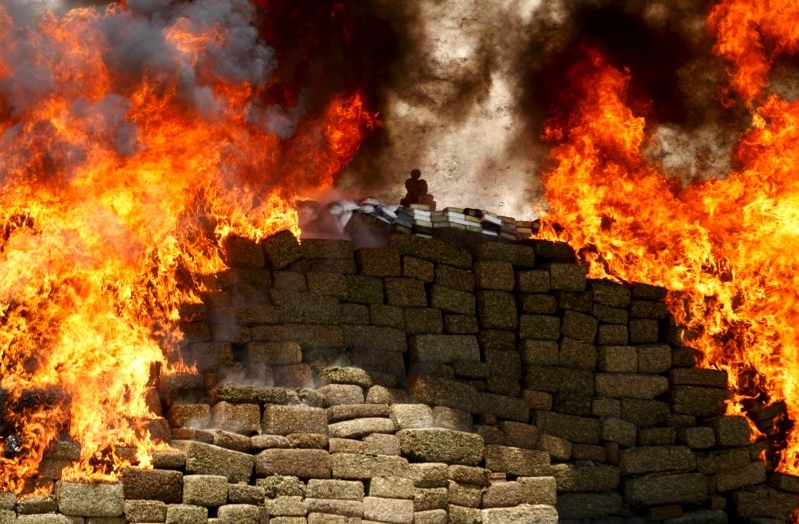
For Mexico City anti-narcotics cop Nieto Lara, a decision by the country's Supreme Court that could eventually lead to the legalization of marijuana means only one thing: major cartels abandoning the drug and focusing on harder stuff.
Wednesday's landmark Supreme Court ruling would allow four people to grow and consume the plant for recreational use in a country ravaged by a decade of drug violence, but any nationwide legalization of marijuana is likely years away.
The potentially game-changing prospect that California could join a growing list of U.S. states that have legalized pot, coupled with low prices and shifting attitudes in Mexico, could eventually lead the country's gangs to shift away from one of their original exports, many Mexican dealers, police and drug policy experts say.
"If the government allows the sale of marijuana, the price will fall and the cartels will get into some other type of drug, because it won't give them the same profits as it does now," Lara said.
What happens next in Mexico will be keenly watched by proponents and critics of drugs reform elsewhere in the Americas, as governments from Uruguay to Canada have grown weary of the four-decades-long U.S.-led "war on drugs."
It would take four more consecutive decisions of the same kind, or eight of the 11 permanent justices to agree, for the Mexican Supreme Court's ruling to set an official precedent and force the government to review the law.
Some marijuana advocates say the decision has inspired them to redouble their efforts.
Fernando Belaunzaran, a leftist politician and leading advocate of drug reform, said he would be one of "many" Mexicans to submit similar appeals in the coming days so the court could establish a wider precedent.
"Appeals are going to rain down," he said, estimating that the process could take between one and two years.
With legalization fervor bubbling in both Mexico and many parts of the United States, the fallout from the end of U.S. Prohibition in the 1930s could inspire the cartels' next move.
"The Mafia abandoned alcohol," said Mark Kleiman, a drug policy expert who advised regulators in the U.S. state of Washington as they drafted marijuana regulations. "Any illegal business cannot compete with a legal business except for under extraordinary circumstances."
SMALL WEED, BIG WEED
Nevertheless, some in the underground economy, like Mexico City marijuana dealer Jose, see legalization as a way to go legit.
Along with friends, he is already investigating how he could jump on what he views as an inevitable change, and professionalize his operation to raise his weekly sales above the 3,000 pesos ($181) he currently makes.
"For me, (legalization) would be so wonderful. I see it as more professional, like when you go to the supermarket, and you can choose organic products or more basic products," he said.
Still, he said, for the big cartels, a legal pot market would offer "next to nothing."
Marijuana sales in the United States make up between 20 and 30 percent of Mexican drug gangs' sales, experts say, but in Mexico, where less than 10 percent of the population uses the drug, they make up far less.
In Mexico City's tough-as-nails Tepito neighborhood, one of the capital's major drug distribution hubs, 5 grams of cannabis sells for 40 pesos ($2.37), Lara said.
Marijuana is the capital's best-selling drug, and drug "shops" in Tepito usually shift 200-300 kilograms every two weeks, he said. But the drug is much less profitable than crack, which goes for 60-80 pesos per half-gram, or cocaine, which sells at 120-140 pesos for the same amount, Lara said.
With marijuana already so cheap, and any legalization likely to increase supply and lower prices further, Lara said cartels would be forced to drop the unprofitable product.
Research by brokerage Convergex on marijuana prices in Colorado, which legalized its use and sale in 2012, showed that the average price of an eighth of an ounce fell from $50-$70 in June 2014 to $30-$45 in June this year.
U.S. AND THEM
Not everyone is convinced that Mexican legalization will push the cartels into harder narcotics.
"I don't think there's any sense that if we take marijuana away from them, that will incentivize them to move into other areas," said Ethan Nadelmann, executive director of the Drug Policy Alliance. "I think they're already incentivized to move into as many areas as they can."
However, experts said the growing possibility that California would legalize marijuana in 2016 - despite voters in the U.S. state of Ohio earlier this week soundly rejecting a legalization proposal - had the potential to dramatically change overall U.S policy toward the drug.
"I see no reason for (the cartels) to continue to have marijuana as a significant percentage of their business once large-scale legalization is achieved," said Alison Holcomb, one of the architects of marijuana legislation in Washington state.
Mexican officials are keenly aware that legalized dope in California could heighten pressure for them to follow suit, Nadelmann said.
During a recent visit to the Mexican capital, California Governor Jerry Brown was asked by Mexican President Enrique Pena Nieto whether he thought California might soon legalize pot. Brown said he expected it to be on the ballot in 2016, and that it would win, Nadelmann said.





![[Exclusive Interview] A revelation within the brink of life and death — Meg Leung’s mission in Christian art](https://www.gospelherald.com/media/cache/thumbnail/7/21/72163sp_273w_150h_1x_1y.jpg)

